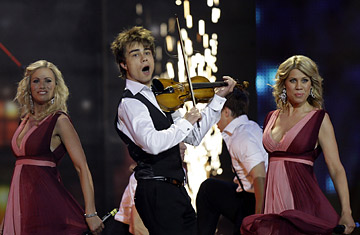
Norway's Alexander Rybak, center, performs during the Eurovision Song Contest final in Moscow
Critics deride the Eurovision Song Contest as a cultural Chernobyl, an ostentatious talent show in which gaudiness and sex appeal have more currency than musical ability. During the May 16 final, watched by more than 100 million people worldwide, contestants once again called upon their decidedly nonmusical charms: the Greek entry ripped his shirt to expose a waxed chest, while the Albanian entry wore a pink tutu and stood on a wind machine. But in the end, Alexander Rybak, a boyish fiddle player from Norway, stormed to victory because he had the best song — and he didn't even have to flash anyone.
"I won because I had a story to tell," Rybak, 23, told reporters after setting an event record with 387 points, which put Norway well ahead of second-place finisher Iceland, which scored 218. In "Fairtyale," Rybak mixed stellar vocals with Scandinavian kitsch. He sang about his obsession with a lost love while a folk troop performed a centuries-old Norwegian mountain dance consisting of backflips and exaggerated push-ups. "In Russia, they like nostalgia and melancholy," he said, explaining why he thinks his wistful tune appealed to millions of voters in Russia and former Soviet states. That his folksy ditty channeled the sounds of Vladivostok more than Oslo probably didn't hurt. (See Eurovision's most controversial moments.)
In recent years, East European nations have dominated Eurovision — Russia won last year, Serbia the year before, and Ukraine finished second both times. It may seem like sour grapes, but commentators from losing countries (the U.K. finished last in 2008) have consistently complained that the public phone vote used to determine the winner has ensured that historical ties always trump song quality. An entry from Greece, for example, could still earn top points from Cyprus, even if the song is painful to listen to. (See a TIME package on loving Eurovision.)
Last night, under new rules designed to stop this type of bloc voting, 50% of the points were awarded by the traditional public phone-in and 50% by a panel of music producers in each country. Advocates of the new jury system will be quick to say it helped Norway transcend borders — with a mix of fans and more objective industry experts voting, Belarus, Latvia, Lithuania and Russia all awarded Norway the maximum 12 points, thereby snubbing one another. But since Eurovision has no plans to reveal which national juries voted for which countries, its actual effect is difficult to determine. In any event, it's likely the East would have voted for Rybak anyway; he was born in Minsk and speaks fluent Russian, and in recent weeks he has become a media darling in the Russian-speaking world.
This year's event was the most expensive in Eurovision's history, with Russia forking over an estimated $35 million to stage it. In return, locals were privy to some camptastic performances. In a delightful English-as-a-second-language moment, Romania's Elena Gheorghe, the daughter of a priest, sang that her "hips are ready to glow, this record is so hot and I have so much to show." American burlesque star Dita von Teese stripped down to a black bustier to play the title role of Germany's entry, "Miss Kiss Kiss Bang"; she had originally hoped to go further, but officials warned her to respect "cultural differences." And the Ukraine's Svetlana Loboda, singing "Be My Valentine," did the splits on a ladder set inside an oversize wheel (which she paid for by mortgaging her house). The blogosphere has since labeled her a "stripper in a hamster wheel."
But not even a spectacle like that could blind viewers to the controversies, which at times seemed louder than the songs. In March, Eurovision officials formally disinvited Georgia from participating because its entry, "We Don't Want to Put In," seemed to mock Russian Prime Minister Vladimir Putin in the wake of the conflict in the breakaway region of South Ossetia. On May 15, the chief of the Russian jury withdrew after he was spotted enjoying a caviar lunch with eventual winner Rybak in Moscow, potentially compromising his impartiality. (Read "Eurovision in Russia: Politics and Pop Music.")
And just hours ahead of the final, Moscow's riot police squashed a gay-pride rally, hauling away about 40 demonstrators. Critics said that clamping down on gay activists at Eurovision seemed decidedly out of tune with the show's mission to promote peace and harmony among the competing countries. As Rybak said himself, "Why did [the police] spend all their energy stopping gays in Moscow when the biggest gay parade was here tonight?"
